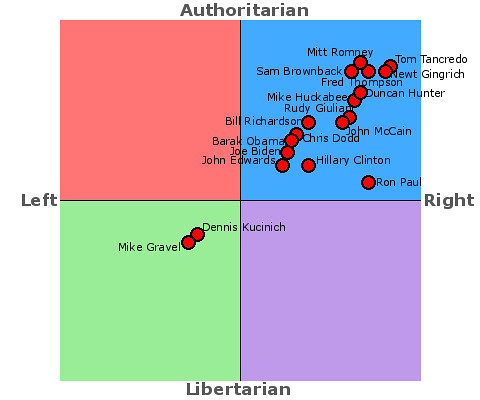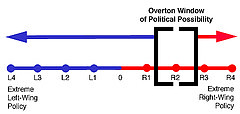
...When an airplane travels at a speed faster than sound, density waves of sound emitted by the plane cannot precede the plane, and so accumulate in a cone behind the plane. When this shock wave passes, a listener hears all at once the sound emitted over a longer period: a sonic boom. As a plane accelerates to just break the sound barrier, however, an unusual cloud might form. The origin of this cloud is still debated. A leading theory is that a drop in air pressure at the plane described by the Prandtl-Glauert Singularity occurs so that moist air condenses there to form water droplets...
There's always a price to be paid when natural barriers are broken.
Someone should tell that to the NeoCons who are still trying to make their own reality without regard to the blowback. Or is it because it's exactly the blowback they want?
Steve Clemons:
...there are bad guys in Iran who so desperately want to consolidate their political positions inside Iran that they see a hot conflict with the U.S. and/or Israel as "helpful". It's also clear that Vice President Cheney as well as his followers inside the administration and his ideological following in Washington's think tank sector want war to pump up their eroding political position.
But Ledeen, James Woolsey, Norman Podhoretz, and others want war now with Iran. They want the bombs to fly. They are obsessed with delegitimating the important diplomatic efforts of Undersecretary of State R. Nicholas Burns, US Ambassador to Iraq Ryan Crocker, Ambassador to the United Nations Zalmay Khalilzad, and others. They despise Defense Secretary Bob Gates and Secretary of State Condoleezza Rice -- and they are increasingly offering defamatory comments about George W. Bush himself at their small dinner parties and neocon gatherings...
The Cheneyburton cabal gives lip service to their masters, the Saudi Royals, and Poppy's Consigliere. The findings of the Iraq Study Group are now the (un)official policies of the land, both DINOcrat and Rethuglican, regardless of Dear Leader's dragging feet. He hates it when his daddy tells him what to do.
But Cheneyburton himself fears the loss of power. It's not just that powerless, people might start to add things up and throw him in prison for the rest of his unnatural life. Power's his aphrodisiac, his reason to keep his unnatural heart beating, and the insane words of sycophants give voice to his own secret plans for hegemony. He has a host of followers, in the light of the American Enterprise Institute, like Michael Ledeen, and jockeying for their own Rings of Power behind the scenes, like David Addington.

But the results of expanding the War on Terra to Iran are too apparent to too many, and scare even the Saudi Royals and their Consigliere. That's not to say
those who prefer to move behind the scenes aren't moving that way regardless. The consequences of a full unleashing of the dogs of war with Iran are best described by
Arthur Silber:
...So an attack on Iran, even if confined to the use of conventional weapons, would confirm beyond the point of any remaining dispute that we have abandoned all the constraints on military action that the world has accepted for some time. We would make indisputably clear that we believe we have the "right" to make war on any nation, at any time, and on the merest whim. The existence of a threat to the United States is irrelevant and unnecessary to our actions. In effect, we will have declared war on the entire world, at least by implication. No one will be able to view themselves as safe: those we consider allies today might be viewed as enemies tomorrow. All concepts of "right" and "morality" would be jettisoned forever. We will have entered a world where brute force and military superiority are all that matter. Since no other nation can view itself as safe from our wrath, we can expect the rest of the world to make plans accordingly.
When the unprovoked, aggressive and non-defensive use of nuclear weapons is added to this picture, we will have entered a world of potential global holocaust...
Silber goes on to quote a post from Billmon on this topic. Of course, Billmon's presence- and website, and archives- have been Disappeared from cyberspace, so I quote this here for posterity. Until I Disappear, too:
...So let’s look at what the human costs of dropping a tactical nuclear weapon on Iran might entail.
They are astronomical.
"The number of deaths could exceed a million, and the number of people with increased cancer risks could exceed 10 million," according to a backgrounder by the Union of Concerned Scientists from May 2005.
The National Academy of Sciences studied these earth-penetrating nuclear weapons last year. They could "kill up to a million people or more if used in heavily populated areas," concluded the report, which was sponsored by the U.S. Department of Defense.
Physicians for Social Responsibility examined the risks of a more advanced buster-bunker weapon, and it eerily tabulated the toll from an attack on the underground nuclear facility in Esfahan, Iran. "Three million people would be killed by radiation within two weeks of the explosion, and 35 million people in Afghanistan, Pakistan, and India, would be exposed to increased levels of cancer-causing radiation," according to a summary of that study in the backgrounder by the Union of Concerned Scientists...

And the opposition?
There ain't no steenkin' opposition:
...The Democrats don't object and they completely fail to mount serious opposition to our inevitable course toward widening war and an attack on Iran, not because they are cowards, not because they're afraid of being portrayed as "weak" in the fight against terrorism, and not because of any of the other excuses that are regularly offered by their defenders. They don't object because -- they don't object. That is: they agree -- they agree that the United States is the "indispensable" nation, that we have the "right" to tell every other country how it is "permitted" to act, that we must pursue a policy of aggressive interventionism supported by an empire of military bases. They agree about all of it; moreover, in most critical respects, they devised these policies in the first instance, and they implemented and defended them more vigorously and more consistently than Republicans, with the exception of the criminal now residing in the White House.
They agree. Try to wrap your head around it. Try to absorb the indisputable fact, which has been proven over and over and over again...
Whether conventional or unuclear weapons are used against Iran, like Iraq, this war will be unwinnable. Without tactical nukes, we can not subdue a nation ten times the size of Iraq, particularly while we are trying to subdue Iraq and Afghanistan. And if we do use tactical nukes?
We can not fight the entire world, and emerge as anything other than a glowing radioactive cinder.
Whichever road we take, if we go down it, we will hear the lament from the Serious that No One Could Have Guessed What Would Happen.
If there are any ears that can still hear.

















 is no open view of the wider world. It a fortified thin narrow slit where paranoid gun men snipe at the crowd below.
is no open view of the wider world. It a fortified thin narrow slit where paranoid gun men snipe at the crowd below.




